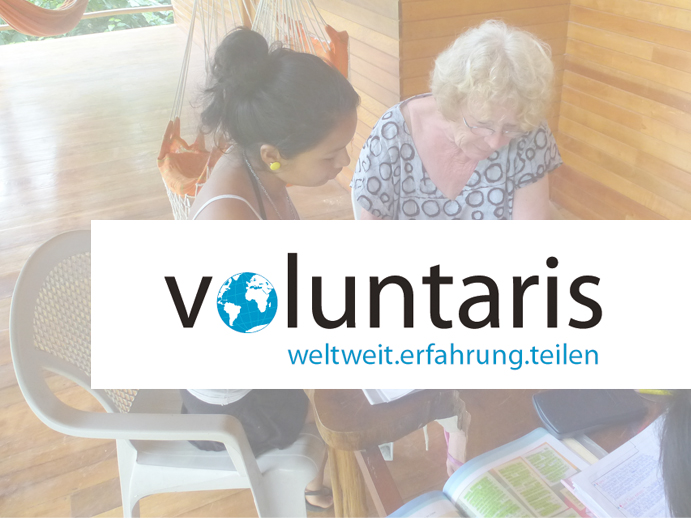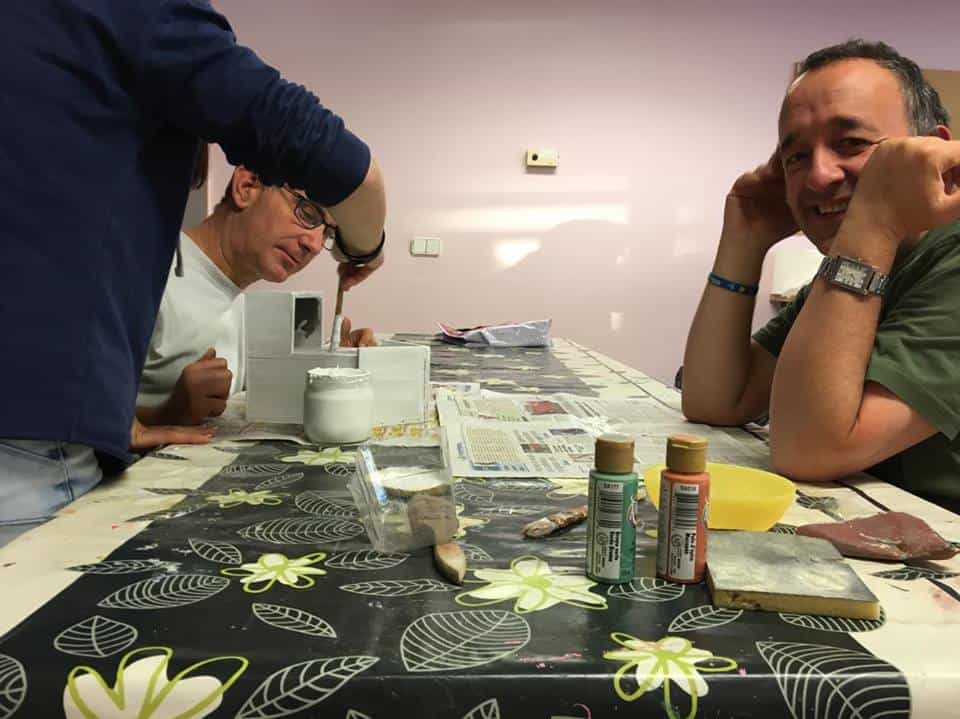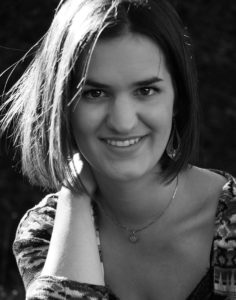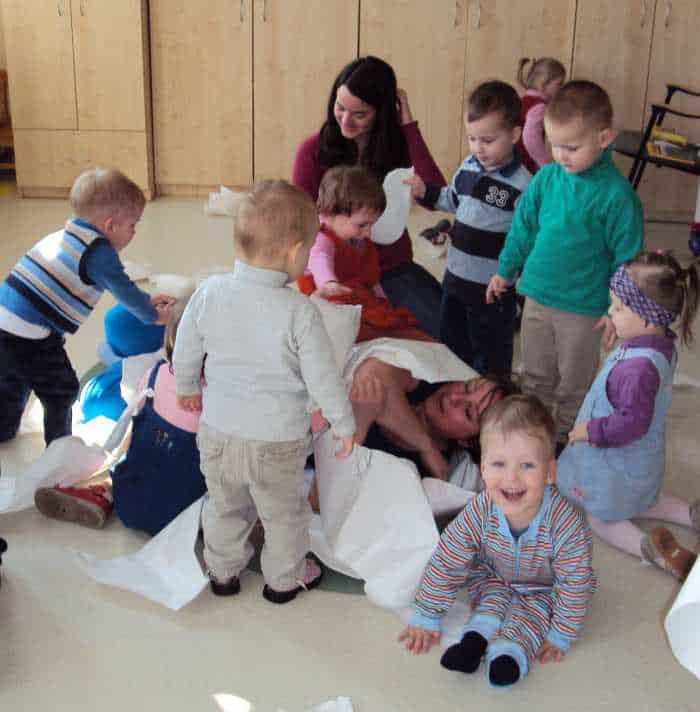3 months as a physiotherapist in South America
Field report by Andrea Nießner
In winter 2012/13, I worked as a physiotherapist in Salinas de Guaranda / Ecuador for 3 months. I had long wanted to travel to Latin America away from the tourist routes and contribute my professional and life experience during a stay abroad. As a physiotherapist, you don't need to take much with you: your hands, head and language skills are all you need.
This assignment was arranged by the organization VOLUNTARIS / Vienna. After extensive consultation with the VOLUNTARIS team and a two-part preparatory course, I decided to spend three months in Salinas de Guaranda, a small mountain village in the Ecuadorian Andes.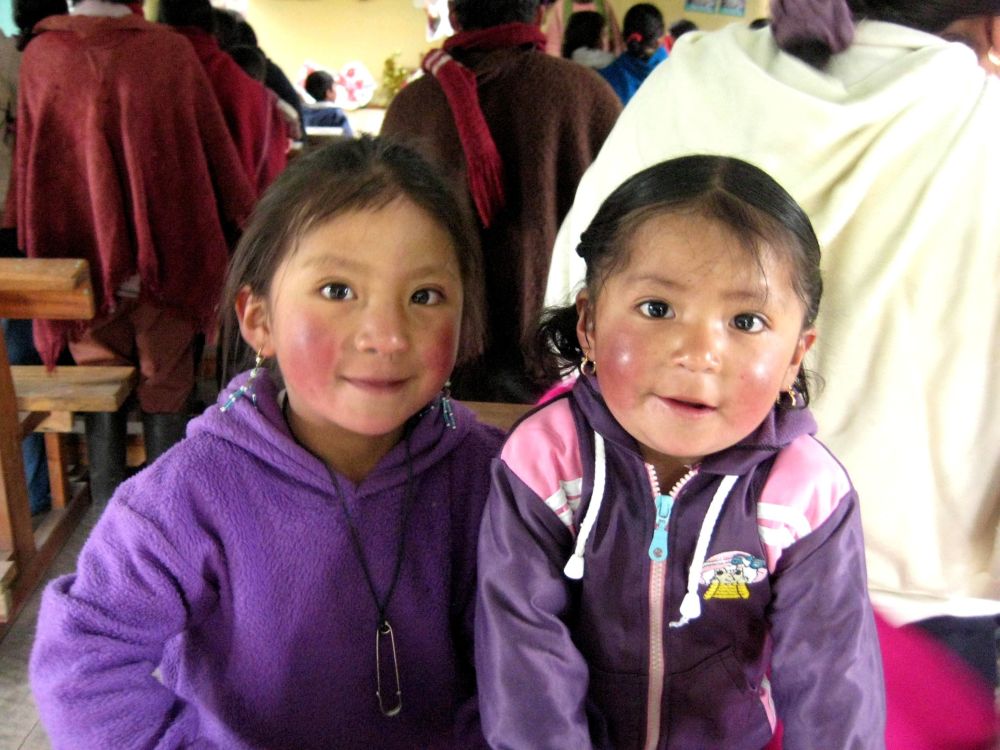
An agricultural cooperative was founded there in the 1970s by the Italian Salesian priest Antonio POLO. The parish includes 28 communities that stretch between the subtropical zone (800 m) and the high mountains of the Andes (4,700 m). With the help of microcredits, investments were gradually made in businesses (wool, chocolate, cheese, tea, etc.), but also in education, health and social projects. The village, situated at an altitude of 3,500 m, previously had 85% illiteracy and an infant mortality rate of almost 50%. Living conditions are still basic today, especially in the smaller villages where people still live in thatched mud huts with open fires, which often lead to chronic bronchitis due to the heavy smoke and sub-zero temperatures at night.
My impression of the VILLAGE and its inhabitants
They always walk. They walk. They put their rubber boots, their well-worn shoes or their bare feet into the landscape. Leaving traces in the rain-soaked volcanic soil, on laboriously tilled fields on the steep slopes. Women with brightly colored shawls: their thermal protection in the cold, their carrying straps when they were carrying home the whey, the dregs, in blue 10-liter barrels or shopping at the weekly market. A light gray donkey stands pegged to the side of the road, with donkey patience. Day after day in the same place. Lucky to own a beast of burden.
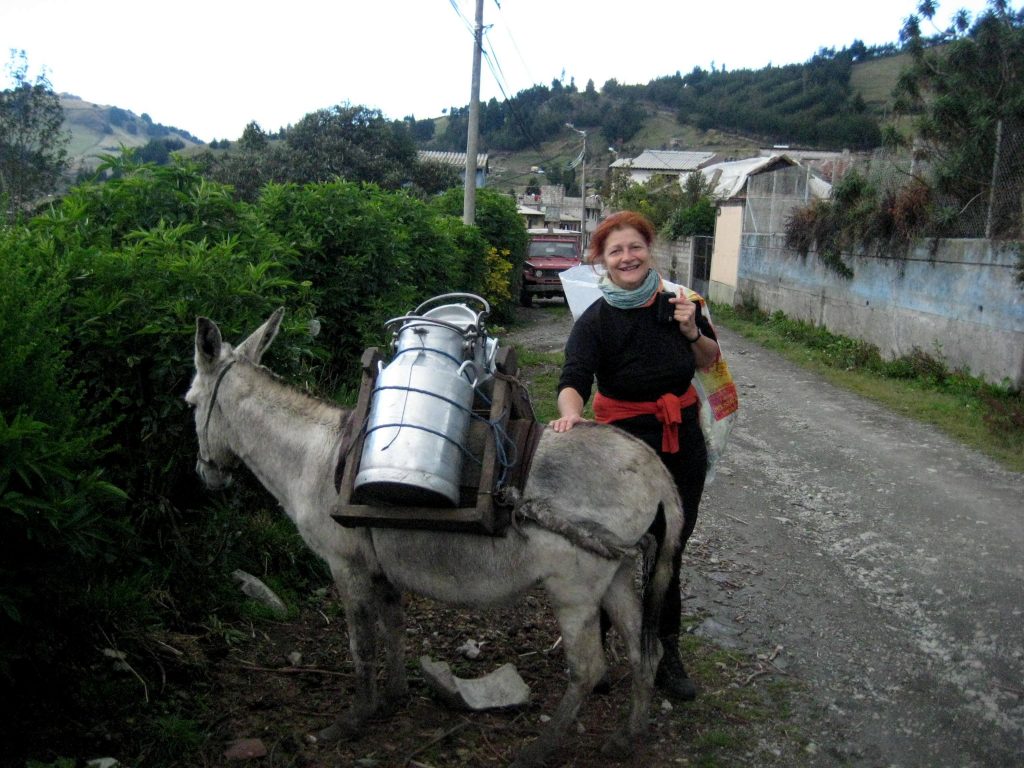
Every Tuesday, the weekly market takes place in Salinas, where farmers and traders bring their goods for sale. Vegetables, meat and fruit are offered for sale in the large hall, while the other consumer goods can be found in stalls in front of the building. There are household items, crockery, mostly made of metal or plastic, milk buckets and jugs, clothes, cell phones and headphones, the beautiful colorful woolen scarves. Sometimes the shoe dealer makes his presence felt, he has unpacked dozens of rubber boots today. They are in great demand because they are useful for working in the fields and for long walks in the rain. Because when it rains here, it rains a lot. Empanadas are sold, grilled trout and corn on the cob, roasted meat. It smells of burning, a large cloud of smoke drifts through the village, which cannot rise to the sky when it rains and spreads like an umbrella over people's heads.
A large bus is waiting outside the market hall to take people back to their villages. It is brightly painted and open at the sides, looks a little old-fashioned, and when it starts, black smoke billows out of the back. Sacks and boxes are loaded onto it, and often a donkey or a cow is taken along on the loading area. People sit tightly packed on the benches. Most of them smell of smoke, as there is an open fire burning in many of the houses. The nights are cold, sometimes below 0°, and there are hardly any heaters here, at least one large log always keeps the embers burning.
My work with the ADULTOS MAYORES
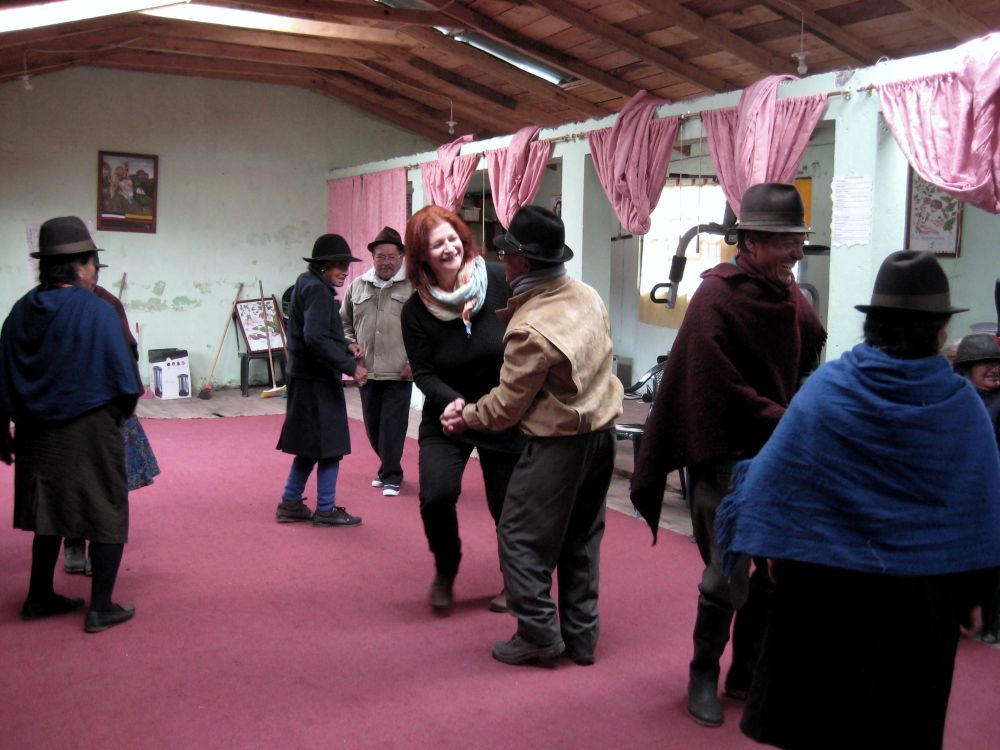
The project for senior citizens had only just been set up: meetings are held three times a week, usually attended by 20-30 of the 50 or so people registered. At the beginning, current issues are discussed (lectures, events), then there is a block of group and individual therapy (in parallel), and at the end a warm meal. Group gymnastics and dancing to Ecuadorian music introduce my "entry" at our very first meeting. And this first dance pushes me to my limits: while the small, agile indigenous people hop around happily, I quickly run out of breath. No wonder after only a week at this altitude.
The senior citizens usually keep their hats on at these gatherings; it seems to be part of their identity. Most of them enjoy coming. They chat and share news from the village. Mercedes, the project manager, and I take it in turns to look after them, and sometimes we work in parallel during the individual therapy sessions.
Rosa M. never misses a meeting. She comes from Yuraucsha, which is 4,200 meters above sea level, and it takes her almost two hours to get here. The first thing she does at the center is get on the treadmill and stride briskly along in her rubber boots. The CD with Ecuadorian folk music is playing. By the end, the whole earth is on the ground. Sometimes people don't wear socks. They are in their bare shoes. Black feet, full of earth. In this cold.
HOUSE VISITS and other
A cancer patient, a patient with a stroke, a patient with knee problems and a child with severe spasticity following a traumatic brain injury who lives in a small village received home treatment.
Today we continue on the bumpy road to Yacubiana.
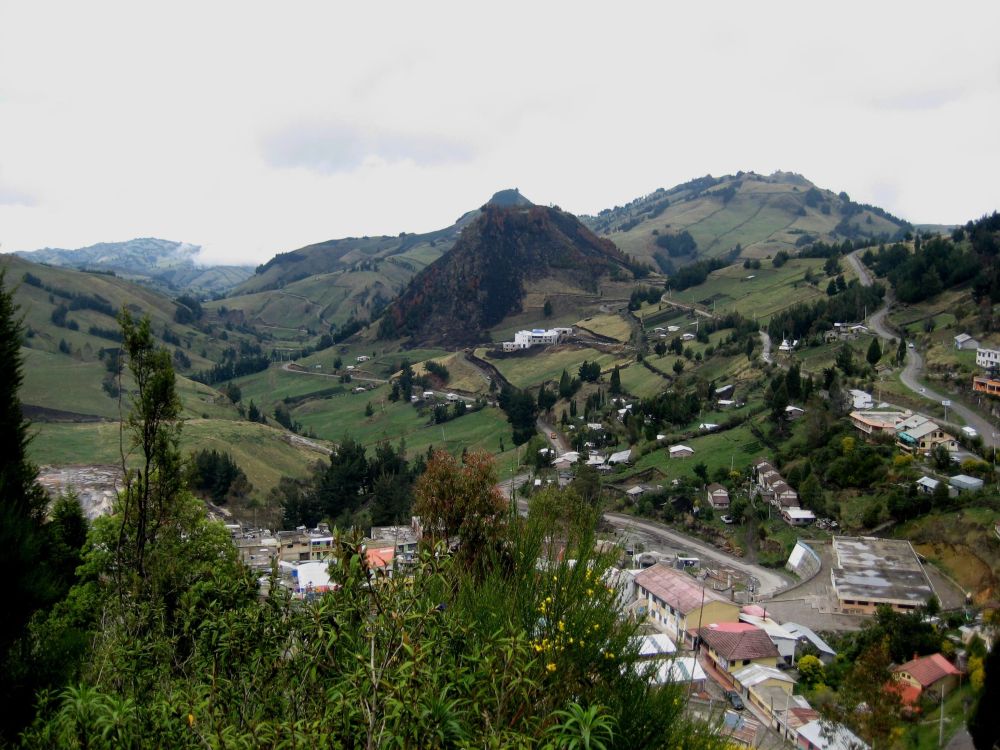
I marvel at how steep the slopes are where potatoes are still grown. We climb higher and higher, the fog thickens until the small village appears in a blur. Father Antonio stops in front of a newly built house, the door is locked. Silvia, the mother, opens it and leads us into the children's room. Marcito is lying in bed on many blankets wearing a dark blue cap. It is quite chilly in the room, the electric heating is not working at the moment. As I find out later, a house has been built for the family with the support of Familia Salesiana to make it easier to care for them. Photos of the house being built hang on the wall, photos of Marcito in his wheelchair, his parents and the Italian volunteers who helped with the construction. A gas stove has been installed in the kitchen, as the smoke from an open fire would have been harmful to the severely disabled child, as Marcito has been in a coma for a long time.
We hand Silvia our presents. First she arranges the blankets on the bed, then she takes her child in her arms. She talks incessantly to her son, telling him that the señora has come to move him and will do him good, singing songs to him in between. She tells me that she moves him every day and what her daily routine is like. She has to leave him alone in between because she has to milk the cows in the morning and her husband takes the milk to the dairy. The best thing would be if he could speak a few words, she says. We talk about medication, the doctors' prognoses.
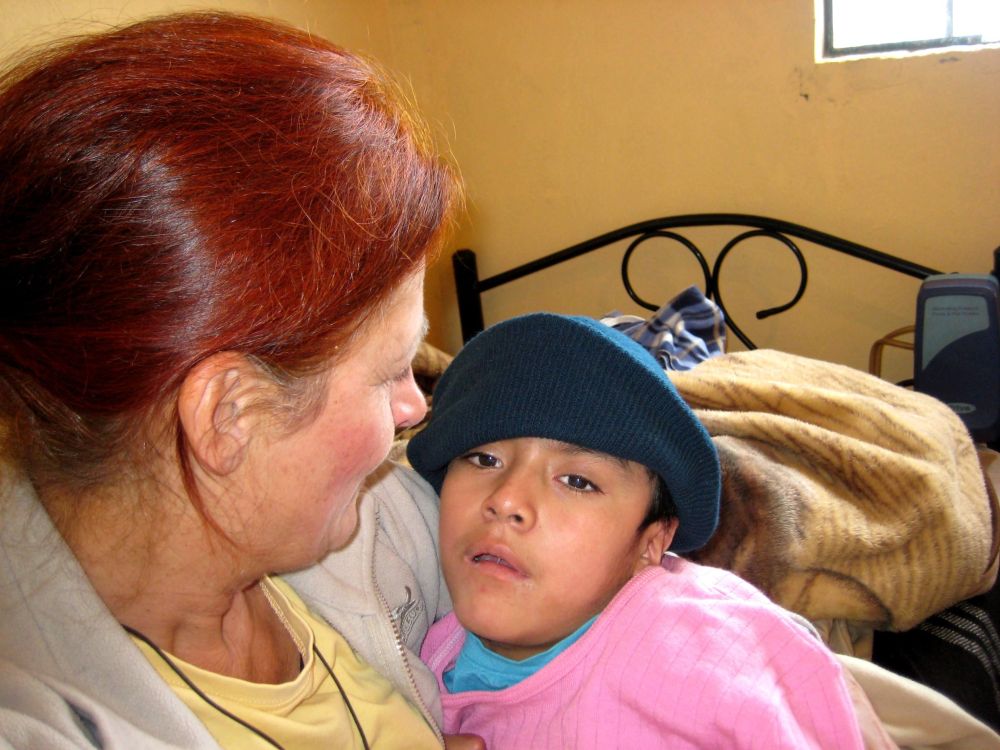
Later she hands him to me, I sense what I have already seen, the child is severely spastic. I get an overview of how flexible his joints are and how he reacts to my speech. Silvia leaves us alone. He sometimes cries quietly when I move his joints, but I can calm him down, especially when I sing nursery rhymes and talk to him. His father tells me that he had a particularly good relationship with animals before his accident and was already riding horses at the age of 6. And he wishes he had photos of the child before the accident.
In addition to Marcito, during my stay I treat Padre Antonio, office workers, Italian volunteers and knitters from TEXAL, with whom I work on compensatory exercises for their often stressful working posture. We put the poster on paper with "Strichweiberln" and hang it up in the company.
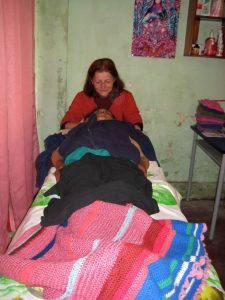
Apart from my work as a physiotherapist, I also enjoy looking after the vegetable garden that belongs to the parish household. The day Father ANTONIO showed me the garden, I started to feel at home. If only I could cultivate a garden somewhere in the world, dig into the soil. A month later, I will suggest that I start a compost heap. And the padre says, "Then I'll always think of you when I empty the organic waste." The compost, a symbol of the cycle of growth and decay. Here and there. I will explain to the children who help me how valuable this soil is, that microorganisms can turn waste into wonderful soil. And that it costs nothing except a little care.
I learned a lot from my stay there: that it is possible to do meaningful professional work outside of our standards, work that requires flexibility and improvisation on a daily basis. I shared my interest in botany with Padre Antonio and got to know the diversity of Ecuador's flora and fauna. I experienced the tradition and culture of these people, and how exuberantly FIESTAS are celebrated.
It was a wonderful experience for me, and the warmth of these people touched me deeply.
(Photo rights: Andrea Nießner / Thanks to voluntaris and Andrea Nießner for the permission to publish this article)
